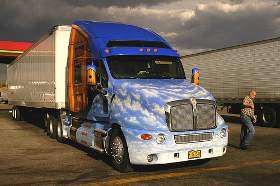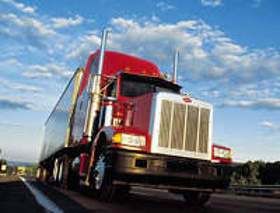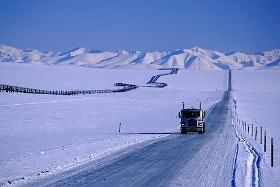Just Got My CDL-A, Have An Urgent Question.
Topic 20303 | Page 1
It is best to be upfront. If those particular drugs are not allowed, they may have you go change what you are on to something that is approved. You of course will have some wait before coming back to demonstrate that you have adjusted well to the new medication.
HOS:
Hours Of Service
HOS refers to the logbook hours of service regulations.
Be truthful with them before you take the test. Take your script bottles with you, show them to the examiner.
As Patrick has accurately stated; if the two substances are on the banned substance list (FMCSA) and/or the company you are hiring with doesn't allow them. Be prepared to drop back and punt; visiting your Doctor to find something that is allowed, and keep trying. Above all else be honest, communicate, and document your discussions.
CSA:
Compliance, Safety, Accountability (CSA)
The CSA is a Federal Motor Carrier Safety Administration (FMCSA) initiative to improve large truck and bus safety and ultimately reduce crashes, injuries, and fatalities that are related to commercial motor vehicle
FMCSA:
Federal Motor Carrier Safety Administration
The FMCSA was established within the Department of Transportation on January 1, 2000. Their primary mission is to prevent commercial motor vehicle-related fatalities and injuries.
What Does The FMCSA Do?
- Commercial Drivers' Licenses
- Data and Analysis
- Regulatory Compliance and Enforcement
- Research and Technology
- Safety Assistance
- Support and Information Sharing
Fm:
Dispatcher, Fleet Manager, Driver Manager
The primary person a driver communicates with at his/her company. A dispatcher can play many roles, depending on the company's structure. Dispatchers may assign freight, file requests for home time, relay messages between the driver and management, inform customer service of any delays, change appointment times, and report information to the load planners.
I appreciate the feedback.
I sent a text message to the woman who is my recruiter or whatever. The individual that oversees my application process. She mentioned that I needed to note any prescription medications I take, but I didn't see an area on the application form for that so I was unable to fill out that portion. So in my text I told her that, and then I clarified what medications I take so as to avoid any confusion during orientation.
I'm waiting to see what her response is. If anything, she'll tell me no I can't be taking those meds while working for said company and I can wait until my system is clean and I can reapply later. Or she could (hopefully) tell me that if I have proof of prescription that they'll accept me as an employee.
It sucks because I need to be working now, and I don't want to just pick up a stupid part time dish washer job while I'm waiting to get clean. What a bummer man.
HOS:
Hours Of Service
HOS refers to the logbook hours of service regulations.
Just a quick update. I called swift and asked them about that sort of thing and the recruiter said they only do urine testing and that for my prescriptions he said just call my medical examiner that issued my medical card and see what he says to make sure it's okay to use these prescriptions.
Should I call and ask? Or should I just forget it and go do the **** test and get hired on?

There is definitely a place on the form to list all of the medication you are on. Bring the bottles with you and be totally up front during orientation.
JJ

Rusty part of the exam is to not only understand what prescribed Meds you or on but also why.
I suggest to check out this link:
See if your meds are on any of the CFR lists.
CSA:
Compliance, Safety, Accountability (CSA)
The CSA is a Federal Motor Carrier Safety Administration (FMCSA) initiative to improve large truck and bus safety and ultimately reduce crashes, injuries, and fatalities that are related to commercial motor vehicle
FMCSA:
Federal Motor Carrier Safety Administration
The FMCSA was established within the Department of Transportation on January 1, 2000. Their primary mission is to prevent commercial motor vehicle-related fatalities and injuries.
What Does The FMCSA Do?
- Commercial Drivers' Licenses
- Data and Analysis
- Regulatory Compliance and Enforcement
- Research and Technology
- Safety Assistance
- Support and Information Sharing
DOT:
Department Of Transportation
A department of the federal executive branch responsible for the national highways and for railroad and airline safety. It also manages Amtrak, the national railroad system, and the Coast Guard.
State and Federal DOT Officers are responsible for commercial vehicle enforcement. "The truck police" you could call them.
CMV:
Commercial Motor Vehicle
A CMV is a vehicle that is used as part of a business, is involved in interstate commerce, and may fit any of these descriptions:
- Weighs 10,001 pounds or more
- Has a gross vehicle weight rating or gross combination weight rating of 10,001 pounds or more
- Is designed or used to transport 16 or more passengers (including the driver) not for compensation
- Is designed or used to transport 9 or more passengers (including the driver) for compensation
- Is transporting hazardous materials in a quantity requiring placards
Fm:
Dispatcher, Fleet Manager, Driver Manager
The primary person a driver communicates with at his/her company. A dispatcher can play many roles, depending on the company's structure. Dispatchers may assign freight, file requests for home time, relay messages between the driver and management, inform customer service of any delays, change appointment times, and report information to the load planners.
Rusty part of the exam is to not only understand what prescribed Meds you or on but also why.
I suggest to check out this link:
See if your meds are on any of the CFR lists.
Hey G-Town, again sorry to jump off topic but I've been wanting to talk to you. I sent you another reply and I'm not sure yet if you received it. I just started with SWIFT and was supposed to be OTR solo. Right off the bat they started giving me load offerings on the Walmart dedicated routes. Then they offered me a spot. Today I accepted and now they are going to put me on reefers too. I've already got the more important questions answered before I gave them my yes, but surely more will arise. Anyway, even if we don't talk more directly I will lurk and read your posting history. Don't worry, the voices tell me I'm quite sane. It's everyone else that's mad. :)
Dedicated Route:
A driver or carrier who transports cargo between regular, prescribed routes. Normally it means a driver will be dedicated to working for one particular customer like Walmart or Home Depot and they will only haul freight for that customer. You'll often hear drivers say something like, "I'm on the Walmart dedicated account."
OTR:
Over The Road
OTR driving normally means you'll be hauling freight to various customers throughout your company's hauling region. It often entails being gone from home for two to three weeks at a time.
CSA:
Compliance, Safety, Accountability (CSA)
The CSA is a Federal Motor Carrier Safety Administration (FMCSA) initiative to improve large truck and bus safety and ultimately reduce crashes, injuries, and fatalities that are related to commercial motor vehicle
FMCSA:
Federal Motor Carrier Safety Administration
The FMCSA was established within the Department of Transportation on January 1, 2000. Their primary mission is to prevent commercial motor vehicle-related fatalities and injuries.
What Does The FMCSA Do?
- Commercial Drivers' Licenses
- Data and Analysis
- Regulatory Compliance and Enforcement
- Research and Technology
- Safety Assistance
- Support and Information Sharing
DOT:
Department Of Transportation
A department of the federal executive branch responsible for the national highways and for railroad and airline safety. It also manages Amtrak, the national railroad system, and the Coast Guard.
State and Federal DOT Officers are responsible for commercial vehicle enforcement. "The truck police" you could call them.
CMV:
Commercial Motor Vehicle
A CMV is a vehicle that is used as part of a business, is involved in interstate commerce, and may fit any of these descriptions:
- Weighs 10,001 pounds or more
- Has a gross vehicle weight rating or gross combination weight rating of 10,001 pounds or more
- Is designed or used to transport 16 or more passengers (including the driver) not for compensation
- Is designed or used to transport 9 or more passengers (including the driver) for compensation
- Is transporting hazardous materials in a quantity requiring placards
Fm:
Dispatcher, Fleet Manager, Driver Manager
The primary person a driver communicates with at his/her company. A dispatcher can play many roles, depending on the company's structure. Dispatchers may assign freight, file requests for home time, relay messages between the driver and management, inform customer service of any delays, change appointment times, and report information to the load planners.Reefer:
A refrigerated trailer.

Rusty part of the exam is to not only understand what prescribed Meds you or on but also why.
I suggest to check out this link:
See if your meds are on any of the CFR lists.
Well the clonazepam is a pill that treats primarily anxiety but it also functions as an anti-depressant and a anti-seizure. But I don't take it for seizures. I take it for mild anxiety.
CSA:
Compliance, Safety, Accountability (CSA)
The CSA is a Federal Motor Carrier Safety Administration (FMCSA) initiative to improve large truck and bus safety and ultimately reduce crashes, injuries, and fatalities that are related to commercial motor vehicle
FMCSA:
Federal Motor Carrier Safety Administration
The FMCSA was established within the Department of Transportation on January 1, 2000. Their primary mission is to prevent commercial motor vehicle-related fatalities and injuries.
What Does The FMCSA Do?
- Commercial Drivers' Licenses
- Data and Analysis
- Regulatory Compliance and Enforcement
- Research and Technology
- Safety Assistance
- Support and Information Sharing
DOT:
Department Of Transportation
A department of the federal executive branch responsible for the national highways and for railroad and airline safety. It also manages Amtrak, the national railroad system, and the Coast Guard.
State and Federal DOT Officers are responsible for commercial vehicle enforcement. "The truck police" you could call them.
CMV:
Commercial Motor Vehicle
A CMV is a vehicle that is used as part of a business, is involved in interstate commerce, and may fit any of these descriptions:
- Weighs 10,001 pounds or more
- Has a gross vehicle weight rating or gross combination weight rating of 10,001 pounds or more
- Is designed or used to transport 16 or more passengers (including the driver) not for compensation
- Is designed or used to transport 9 or more passengers (including the driver) for compensation
- Is transporting hazardous materials in a quantity requiring placards
Fm:
Dispatcher, Fleet Manager, Driver Manager
The primary person a driver communicates with at his/her company. A dispatcher can play many roles, depending on the company's structure. Dispatchers may assign freight, file requests for home time, relay messages between the driver and management, inform customer service of any delays, change appointment times, and report information to the load planners.
Rusty part of the exam is to not only understand what prescribed Meds you or on but also why.
I suggest to check out this link:
See if your meds are on any of the CFR lists.
Hey G-Town, again sorry to jump off topic but I've been wanting to talk to you. I sent you another reply and I'm not sure yet if you received it. I just started with SWIFT and was supposed to be OTR solo. Right off the bat they started giving me load offerings on the Walmart dedicated routes. Then they offered me a spot. Today I accepted and now they are going to put me on reefers too. I've already got the more important questions answered before I gave them my yes, but surely more will arise. Anyway, even if we don't talk more directly I will lurk and read your posting history. Don't worry, the voices tell me I'm quite sane. It's everyone else that's mad. :)
Off topic question, but what's your hometime like in a walmart dedicated route? And how's the pay?
Dedicated Route:
A driver or carrier who transports cargo between regular, prescribed routes. Normally it means a driver will be dedicated to working for one particular customer like Walmart or Home Depot and they will only haul freight for that customer. You'll often hear drivers say something like, "I'm on the Walmart dedicated account."
OTR:
Over The Road
OTR driving normally means you'll be hauling freight to various customers throughout your company's hauling region. It often entails being gone from home for two to three weeks at a time.
CSA:
Compliance, Safety, Accountability (CSA)
The CSA is a Federal Motor Carrier Safety Administration (FMCSA) initiative to improve large truck and bus safety and ultimately reduce crashes, injuries, and fatalities that are related to commercial motor vehicle
FMCSA:
Federal Motor Carrier Safety Administration
The FMCSA was established within the Department of Transportation on January 1, 2000. Their primary mission is to prevent commercial motor vehicle-related fatalities and injuries.
What Does The FMCSA Do?
- Commercial Drivers' Licenses
- Data and Analysis
- Regulatory Compliance and Enforcement
- Research and Technology
- Safety Assistance
- Support and Information Sharing
DOT:
Department Of Transportation
A department of the federal executive branch responsible for the national highways and for railroad and airline safety. It also manages Amtrak, the national railroad system, and the Coast Guard.
State and Federal DOT Officers are responsible for commercial vehicle enforcement. "The truck police" you could call them.
CMV:
Commercial Motor Vehicle
A CMV is a vehicle that is used as part of a business, is involved in interstate commerce, and may fit any of these descriptions:
- Weighs 10,001 pounds or more
- Has a gross vehicle weight rating or gross combination weight rating of 10,001 pounds or more
- Is designed or used to transport 16 or more passengers (including the driver) not for compensation
- Is designed or used to transport 9 or more passengers (including the driver) for compensation
- Is transporting hazardous materials in a quantity requiring placards
Fm:
Dispatcher, Fleet Manager, Driver Manager
The primary person a driver communicates with at his/her company. A dispatcher can play many roles, depending on the company's structure. Dispatchers may assign freight, file requests for home time, relay messages between the driver and management, inform customer service of any delays, change appointment times, and report information to the load planners.Reefer:
A refrigerated trailer.
New Reply:
New! Check out our help videos for a better understanding of our forum features

















Preview:








 TT On Facebook
TT On Facebook
Okay so I just completed truck driving school and I start orientation for the company in about 7 days.
I am concerned about the drug test. I take two PRESCRIBED medications by a doctor.
One is an SSRI called Lexapro (https://www.drugs.com/lexapro.html) the other is a Benzo called Clonazepam (https://www.drugs.com/clonazepam.html)
The company does a Urine and Hair test.
Here are my concerns: 1) IF I tell them I take these medications, they'll deny me employment and send me home. 2) IF I don't tell them I take these medications, I'll fail the drug test and it'll be held against me with future employers. 3) Even though I have the medication prescribed to me, my doctor will not write me a doctors note for it (he's an ass)
What should I do? I have a big decision to make and I'm not sure what the best path to take would be.
What I'm thinking is I'll go to the orientation and then tell them that I take the medication so they can decide if they want to hire me or not. That way it won't be held against me by the DCA or whatever it's called. Since I can't acquire a doctors note, I'm going to at the very least bring my prescription bottles with me that have my name, address, doctor and medication information.
Please help me. I've been wanting to get my CDL for over a decade and I finally got it but I don't want it to go down the drain because of my prescription medication.
CDL:
Commercial Driver's License (CDL)
A CDL is required to drive any of the following vehicles: